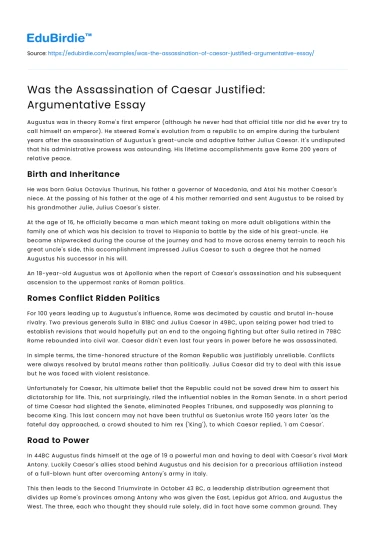Augustus was in theory Rome's first emperor (although he never had that official title nor did he ever try to call himself an emperor). He steered Rome's evolution from a republic to an empire during the turbulent years after the assassination of Augustus's great-uncle and adoptive father Julius Caesar. It's undisputed that his administrative prowess was astounding. His lifetime accomplishments gave Rome 200 years of relative peace.
Birth and Inheritance
He was born Gaius Octavius Thurinus, his father a governor of Macedonia, and Atai his mother Caesar's niece. At the passing of his father at the age of 4 his mother remarried and sent Augustus to be raised by his grandmother Julie, Julius Caesar's sister.
Save your time!
We can take care of your essay
- Proper editing and formatting
- Free revision, title page, and bibliography
- Flexible prices and money-back guarantee
At the age of 16, he officially became a man which meant taking on more adult obligations within the family one of which was his decision to travel to Hispania to battle by the side of his great-uncle. He became shipwrecked during the course of the journey and had to move across enemy terrain to reach his great uncle's side, this accomplishment impressed Julius Caesar to such a degree that he named Augustus his successor in his will.
An 18-year-old Augustus was at Apollonia when the report of Caesar's assassination and his subsequent ascension to the uppermost ranks of Roman politics.
Romes Conflict Ridden Politics
For 100 years leading up to Augustus's influence, Rome was decimated by caustic and brutal in-house rivalry. Two previous generals Sulla in 81BC and Julius Caesar in 49BC, upon seizing power had tried to establish revisions that would hopefully put an end to the ongoing fighting but after Sulla retired in 79BC Rome rebounded into civil war. Caesar didn't even last four years in power before he was assassinated.
In simple terms, the time-honored structure of the Roman Republic was justifiably unreliable. Conflicts were always resolved by brutal means rather than politically. Julius Caesar did try to deal with this issue but he was faced with violent resistance.
Unfortunately for Caesar, his ultimate belief that the Republic could not be saved drew him to assert his dictatorship for life. This, not surprisingly, riled the influential nobles in the Roman Senate. In a short period of time Caesar had slighted the Senate, eliminated Peoples Tribunes, and supposedly was planning to become King. This last concern may not have been truthful as Suetonius wrote 150 years later 'as the fateful day approached, a crowd shouted to him rex ('King'), to which Caesar replied, 'I am Caesar'.
Road to Power
In 44BC Augustus finds himself at the age of 19 a powerful man and having to deal with Caesar's rival Mark Antony. Luckily Caesar's allies stood behind Augustus and his decision for a precarious affiliation instead of a full-blown hunt after overcoming Antony's army in Italy.
This then leads to the Second Triumvirate in October 43 BC, a leadership distribution agreement that divides up Rome's provinces among Antony who was given the East, Lepidus got Africa, and Augustus the West. The three, each who thought they should rule solely, did in fact have some common ground. They wanted to avenge Caesar's death and secure a more stable Roman Republic.
The triumvirate was accepted by the Senate in November 43 BC the trio now having absolute authority for five years. The first task at hand was finding and executing 300 senators and over 2000 knights for their involvement in the assassination of Caesar.
Not surprisingly the triumvirate broke in the year 37 BC as the strong personalities of the three continuously clashed and all would meet in battle leading to a civil war.






 Stuck on your essay?
Stuck on your essay?

